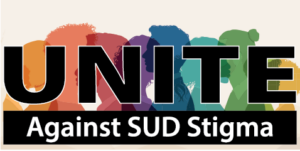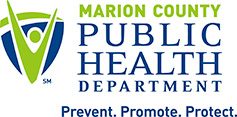
MCPHD was awarded grant funding to pilot the SSAR project through the National Association of County and City Health Officials (NACCHO) with support from the Centers for Disease Control (CDC) and the National Center for Injury Prevention and Control (NCIPC).
The SSAR project aims to better understand the stigma held by Indianapolis Emergency Medical Services (I-EMS) and emergency department (ED) staff in relation to patients with substance use disorder (SUD) and incorporate these findings into developing effective and targeted anti-stigma trainings.
The goals of this project are to:
1. Reduce negative attitudes towards patients with substance use disorder (SUD).
2. Increase health professional engagement with and empathy for patients with SUD.
3. Improve patients’ feelings of empowerment to seek harm reduction and treatment services in Marion County.
What does UNITE stand for?
- Uncover your bias.
- Notice stigmatizing language.
- Identify and share resources.
- Take time to recharge.
- Empathize and empower.
A mixed methods approach was utilized to collect data.
· Quantitative data: 186 surveys collected via REDCap.
· Qualitative data: Four 30–60 minute virtual key informant interviews
**Each survey and key informant interview participant received a $10 gift card incentive.
Results:
1. Lack of Knowledge and Confidence: The initial theme identified was a lack of knowledge and confidence among I-EMS and ED staff. Participant responses indicated a desire for ongoing training on SUD treatment which includes up-to-date resources. Participants reported this lack of knowledge caused feelings of inadequacy and frustration when faced with the care and treatment of patients with SUD. This self-reported lack of knowledge included fearing for the safety of the patient and fear that the medical options available might cause more harm. Furthermore, it elicited feelings of fear for personal safety.
2. Negative previous experience: Due to these previous negative experiences, participants associated patients with SUD to being morally flawed, agitated after receiving naloxone, or generally violent.
3. Hidden Curriculum: Stigma within the professional healthcare system significantly contributes to the difficulty of professionals’ ability to treat patients with SUD. Participants referred to the unspoken culture of residency and learning through hands-on interactions with senior staff. These everyday exchanges in formal and informal settings send implicit messages that residents and staff infer from the behavior of other staff.
4. Lack of interagency coordination and communication: Participants described ease of initial linkages to services, however, great difficulty in maintaining that treatment process.
Positive responses:
Over 150 participants reported they:
· Believe it is their responsibility to ask questions and provide ways to minimize harm and commonly discuss these strategies with patients.
· Understand that people are not ready for treatment.
· Understand that people experience withdrawal.
About the series:
· 3-month webinar series in Summer 2023, hosted by the IUPUI ECHO Center that were designed for medical professionals, first responders, and anyone else interested in learning more about SUD stigma.
· An additional 2-month Fall Series 2023 was added due to popular demand.
· Main goal of this series is to break down stigmas for people with SUD/people who use drugs.
· Each interactive session includes a presentation by experts in the field and opportunities to source questions with leaders in SUD treatment, prevention, and screening.
· No-cost continuing medical education credits (CMEs) are available for the recorded versions of the second and third webinars. These will be available for 12 months on the IU ECHO portal.
· To find additional information about the sessions please visit this website: https://fsph.iupui.edu/research-centers/centers/ECHO/echo-programs/mcphd-echo-series.html
Webinar Links:
- Webinar 2: https://iu.cloud-cme.com/course/courseoverview?P=0&EID=83392
- Webinar 3: https://iu.cloud-cme.com/course/courseoverview?P=0&EID=83393
- Webinar 4: https://iu.cloud-cme.com/course/courseoverview?P=0&EID=93097
- Webinar 5: https://iu.cloud-cme.com/course/courseoverview?P=0&EID=93194
Goal: One of the main goals of the SSAR project was to create a training experience that educates and empowers healthcare professionals to humanize patients with SUD and develop practical skills to interact with and treat these patients.
Strategy: Our SSAR team hired an instructional design expert to develop online anti-stigma trainings that offer healthcare professionals information and guidance on reframing their thoughts on patients with SUD and empower a humanistic and empathetic approach to interaction and treatment. Educational efforts that present evidence-based information while correcting misinformation and dispelling bias are effective methods in overcoming stigma. These trainings are being offered at no cost to local hospitals and I-EMS (Indianapolis Emergency Medical Services) and were designed to prioritize smooth incorporation into various learning management systems.
The SSAR project anticipates the impact of these anti-stigma trainings will humanize patients with SUD by providing personal stories, resources, and education to neutralize harmful perspectives.
The SSAR team has also developed a Facilitator’s Guide for agencies and departments interested in exploring the topic through a discussion-based setting, in-person, online meetings, and/or group or large-group settings. The guide covers the modules through discussion questions, printouts, and resources. This was a suggestion from our Community Health Network partners to combat e-learning fatigue.
Please connect with Mandy Billman at abillman@marionhealth.org, if your healthcare organization is interested in learning more or getting involved.
–UNITE Marion County Resources
– Overdose Lifeline-NaloxBoxes
– Substance Use Outreach Services, MCPHD
– 988 Suicide and Crisis Lifeline




